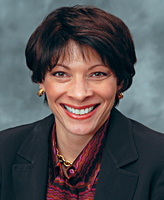| |
 |
| |
Virginia
Clarke '84 |
| |
|
Alumni
Profile: Virginia Clarke '84
Kellogg
a 'second home' to diversity expert Virginia Clarke '84
By
Chris Van Nostrand
"There's
a difference between success and a person's highest or best
use," says Kellogg School graduate Virginia "Ginny"
Clarke '84.
That
perspective stems from her belief that while a person may
rise to remarkable professional heights on ability alone,
a more powerful approach involves using self-reflection to
chart a unique — and rewarding — path. She says
that knowing what you love and where your talent lies can
lead to remarkable opportunities. "This should be an
ongoing assessment," says Clarke. "You should continually
step away from the expectations that others place on you to
figure out who you truly are."
Such
insight has served the Kellogg graduate well in her own career,
including in her current role as partner for Spencer Stuart,
the international executive search firm, where she oversees
its global diversity practice and is a member of the firm's
financial officer practice. In fact, her personal and professional
lives intersect frequently; she's often a speaker at the Kellogg
School, where she discusses career management, and she is
writing a new book with the working title You Choose.
Clarke says the key lesson is that "anything you want
is out there, but you need to create a vision and strategy
for yourself. If you can't tell me exactly what it is that
you want, then you're doing yourself a disservice, and I can't
help you."
The
process of keeping an open mind as the starting point for
defining a clear career path follows Clarke's own Kellogg
experience in the Full-Time MBA Program. "I came from
a liberal arts background wanting to learn more about business,
but I was very malleable. I had a clean slate and just began
thinking 'what do I like and what am I good at?'"
The
answer was finance and accounting, which led to a stint in
banking and then 10 years in commercial real estate. True
to her philosophy, during a period of long reflection Clarke
began evaluating her career and experiences to determine whether
she wanted to remain in the industry or pursue other opportunities.
In the end, she decided that she simply didn't love what she
was doing.
Drawing
on her insights about what had motivated her in the past,
Clarke realized that managing and recruiting talent had always
been a central and rewarding aspect of her life, whether working
on admissions committees as a student at Kellogg or recruiting
people to her company. Acting on her belief that intuition
and insight were her greatest strengths, she decided that
becoming an executive search consultant could let her put
her talents to work in a meaningful way. "Even then,"
says Clarke, "it was two and a half years from the time
I had the concept to when I actually got the job. But that's
the key – you have to approach the process thoughtfully."
As
talent management and human resources emerge as key elements
of corporate strategy, her own story serves as a reference
point in consulting with her clients. "Demographic shifts
demand that we know how to deal with fluid talent pools as
they move around the world," says Clarke. As companies
become increasingly diverse and global, they must become more
attuned to the personal motivations driving every employee. "To find the right fit between an individual and a company,
we need to have more personal conversations with the candidate
since there are more moving parts," she says. "I
need to be aware of cultural and legal considerations, for
example. In leading the diversity practice I tell my clients
that they need to know how to ask the right questions of people
who aren't necessarily like them."
The
enormous constraints that Clarke finds in attracting the right
candidates for a client — such as whether to take the
risk of uprooting a family to follow a job — gives her
an appreciation for the opportunity that Kellogg afforded
her to take time and think about who she was before entering
the workforce. "The school is a second home for me,"she
says. "It was where I grew up after leaving my home state
of California. I graduated when I was 26, so Kellogg has come
to represent my home and my point of professional departure."
|



